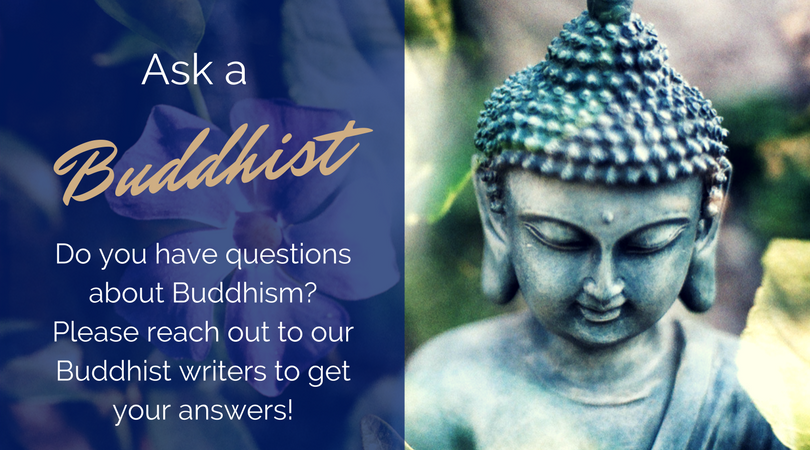What do you want to ask a Buddhist? Fill out the form below or submit your question online.
Why do bad things happen?
Questions like this lead us to explore the concept of karma found in the Buddhist teachings. The Buddha frequently taught about causality, one form of which is the law of karma and its effects. Karma is a Sanskrit word that literally means action, and refers to volitional actions, such as the those we create when we speak or act.
These days, people use the word karma loosely to talk about the results of our actions, “That’s just his karma.” However, the law of karma as Buddha described it is complex and subtle. It is extremely important to understand, as it teaches the ethical dimension of our actions and is the key to taking responsibility for our own happiness.
Before we go further, it’s important to understand a few things. First, the law of cause and effect is not a system of reward and punishment! Second, the Buddha didn’t make it up or create it. He simply explained this universal law out of his great compassion so that ordinary beings like us could take advantage of this knowledge. Third, the law of karma applies to us whether or not we believe in it.
Cause and result
In the world around us, we can see that every result has a cause that came before it. And it’s not just a random cause. Things arise from a cause that is similar or compatible with its result. For example, if we plant a daisy seed, we get a sprout that will grow into a daisy plant with flowers. We will not get a hot chili plant. Results rely on many supporting conditions, too.
Our inner world experiences of happiness and suffering also rely on compatible causes. When we create intentional actions with our body, speech, and mind, these actions leave “seeds” or imprints on our mind, which have the potential to ripen in terms of our experiences when the right conditions come together. An action is considered an unskillful, negative or non-virtuous action if it brings about dissatisfying or painful results in the long term. If it brings about happiness, it’s considered a skillful or virtuous action.
The Buddha taught that happiness comes from previously created positive actions and suffering comes from previous destructive actions. From our own experience, we know that when we generously offer our time to help someone, we immediately feel pleased that we could help them, and we may also receive gratitude from the person we helped, which feels nice. In addition, our kind action leaves a seed of a positive action on our mindstream, and when the conditions come together later in this or a future life, this karmic seed will ripen as happiness experienced in positive events.
Likewise, if we harm others with criticism or harsh, angry speech or physical violence, we immediately feel upset ourselves, and we’ll probably experience an unpleasant reaction from the person we spoke harshly to. In addition, our action of harsh speech leaves a seed of negative karma on our mindstream, and when necessary conditions come together, it will ripen as unhappiness experienced in unpleasant events.
We create the causes
To help us create the happiness we want in life and avoid unnecessary suffering, the Buddha described 10 negative or non-virtuous actions that are wise to avoid—such as killing any living being (including insects), stealing or taking what’s not freely given, unwise or unkind sexual conduct, lying, harsh speech, speaking in a way that divides others, and so forth. We’re also encouraged to practice the opposite of these 10 actions such as protecting life, protecting others’ property, using our sexuality in a wise and kind way, speaking truthfully, kindly, and in a way that brings people together.
Many factors influence whether the seeds of positive and negative actions we’ve accumulated in our mind will give rise to their long-term result. It depends on how strong the action was, and whether its seed meets with the necessary conditions. The good news is that seeds of negative actions can be diminished through purification practices so that they can’t produce their unpleasant results. Unfortunately, we can also damage the seeds of positive actions in our mind, especially by getting angry—so we must be careful.
Not everything is created by our personal karma. For example, hurricanes and tornadoes are produced by the functioning of the laws of nature. However, the fact that some people are impacted by such events and others are not is due to their karma. The coronavirus is a result of biological laws and itself is not caused by karma. However, karma plays a role in its effects on specific people.
The law of causality—karma—is a complex subject, but one that is so useful to learn about. By understanding even a little about the law of causality, we can use our daily experiences to observe how karma functions in our own life. We can then begin to train our minds to develop positive motivations and actions to create more happiness, and to recognize and avoid the unskillful intentions and actions that bring suffering and dissatisfaction.
It’s important to emphasize what I said at the beginning: that karma is not a system of reward and punishment. No one deserves to suffer. When bad things happen, it’s not because someone “has it coming to him.” Further, no one is doling out prizes for good behavior or judgment for negative actions. When things happen—good or bad—we are simply reaping the crop we have previously sown, just as naturally as hay seeds bring a beautiful crop of hay in the fall.
To learn more, you might enjoy these videos on karma by our Abbess at Sravasti Abbey, Ven. Thubten Chodron.











Why eradication of conceit is important in Buddhism